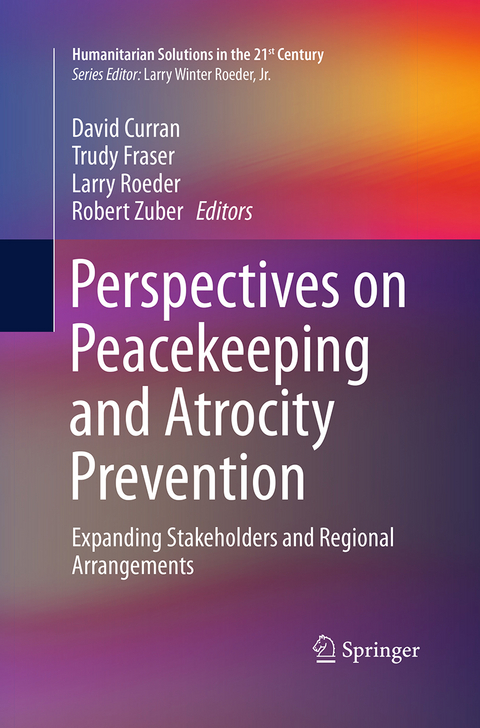
Perspectives on Peacekeeping and Atrocity Prevention
Springer International Publishing (Verlag)
978-3-319-35867-3 (ISBN)
The current challenges and potential future of peacekeeping in an increasingly complex world take center stage in this far-reaching collection.
Contributors advance a nuanced picture of post-conflict environments across different areas of the globe while considering possible deployments of peacekeeping, traditional military and UN forces in semi-autonomous complementary roles. Longstanding debate topics such as the need for a standing UN army and the field implementation of global right-to-protect concepts are discussed, as are emerging ideas in civilian protection, atrocity prevention and balancing triage operations with long-term peacebuilding efforts. Other dispatches chronicle key issues and concerns regarding peacekeeping operations in Brazil, China and diverse regions of Africa.
Included in the coverage:
- Protecting strangers: reflections on a cosmopolitan peacekeeping capacity.
- Towards a standing UN force for peacekeeping.
- Challenges posed by intervention brigades and other coercive measures in support of the protection of civilians.
- Addressing the criminal accountability of peacekeepers.
- The evolution of China's role in peacekeeping and atrocity crime prevention.
- Businesses and investors as stakeholders in atrocity crime prevention.
Multiple viewpoints, a global scope and real-world clarity make Perspectives on Peacekeeping and Atrocity Prevention an invaluable resource to advance the work of humanitarians, criminologists and students of and professionals in international relations.
"This collection of articles effectively points to the challenges, complexities and sensitivities of preventing and halting mass atrocity crimes in part through the use of UN peacekeeping operations. The volume also inspires further efforts, including the integration of new and younger stakeholders, to mitigate massive human rights
crimes and fully implement the Responsibility to Protect."Dr. György Tatár
Chair, Budapest Centre for the International Prevention of Genocide and Mass Atrocities
"In a refreshing and engaging manner, this edited volume represents a much-needed contribution to the debate on how best to address current security threats given the limitations and the possibilities of peacekeeping and atrocity prevention. A compelling feature of the book is its exploration of often-neglected stakeholder perspectives alongside first-hand knowledge of the UN system and astute academic observations of key peacekeeping concepts, mandates and practices. Each chapter's concluding recommendations invite scholars and policy makers to critically interrogate their own beliefs, assumptions and preferred solutions for keeping the peace and preventing mass atrocity violence."
Dr. Maria Stern
Professor in Peace and Development Studies, School of Global Studies
University of Gothenburg
David Curran, PhD, is a Research Fellow at the Centre for Trust, Peace and Social Relations, Coventry University. His primary research interest is in developments in United Nations (UN) peacekeeping. Since completing his PhD at the Department of Peace Studies, University of Bradford, David has undertaken research into a range of topic areas including the role of conflict resolution in training programs for military peacekeepers; the Protection of Civilians in UN Peacekeeping; the evolution of rapid-reaction peacekeeping and peacebuilding forces such as the African Union standby brigades, EU battle groups; and the potential of specialized UN rapid reaction capabilities.
Introduction to the Boon: Evolving Challenges and Alternative Perspectives to Peacekeeping in Complex Security Environments.- Protecting Strangers: Reflections on a Cosmopolitan Peacekeeping Capacity.- Towards a Standing UN Force for Peacekeeping, by David Curran.- Norm Entrepreneurs Advocating the Responsibility to Protect, and Peacekeeping Reform Proposals.- Peacekeeping and the Rule of Law: Challenges Posed by Intervention Brigades and Other Coercive Measures in Support of the Protection of Civilians.- Addressing the Criminal Accountability of Peacekeepers.- Intersected and Complementary Obstacles and Opportunities in Peacekeeping Operations, Atrocity Crime Prevention, and Related Security Responsibilities.- The Evolution of China's Role in Peacekeeping and Atrocity Crime Prevention.- The Protection of Civilians in African Regional and Sub-regional Peace Operations.- Regional Implementation of Peacekeeping: Notes and Lessons from the Brazilian experience in the MINUSTAH.- Businesses and Investors as Stakeholders in Atrocity Crime Prevention.- Conclusion.- Appendix: Biographies of Editors and Authors.
| Erscheinungsdatum | 19.08.2017 |
|---|---|
| Reihe/Serie | Humanitarian Solutions in the 21st Century |
| Zusatzinfo | XIV, 190 p. |
| Verlagsort | Cham |
| Sprache | englisch |
| Maße | 155 x 235 mm |
| Gewicht | 320 g |
| Themenwelt | Recht / Steuern ► EU / Internationales Recht |
| Recht / Steuern ► Öffentliches Recht ► Völkerrecht | |
| Recht / Steuern ► Strafrecht ► Kriminologie | |
| Sozialwissenschaften ► Politik / Verwaltung ► Europäische / Internationale Politik | |
| Schlagworte | armed conflict and protection of civilians • atrocity crime prevention • peacekeeping operations • rapid reaction and peacekeeping • UNDPKO • UN Security Council |
| ISBN-10 | 3-319-35867-7 / 3319358677 |
| ISBN-13 | 978-3-319-35867-3 / 9783319358673 |
| Zustand | Neuware |
| Haben Sie eine Frage zum Produkt? |
aus dem Bereich


